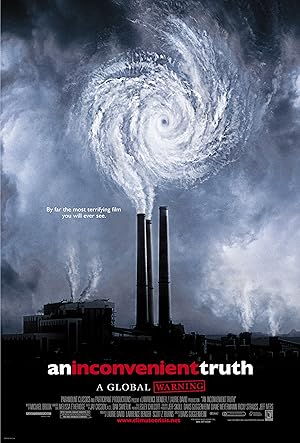
An Inconvenient Truth Page #4
hit Brazil.
Summer of 2005 has been
one for the books.
The first one was Emily
that socked into Yucatn.
Then Hurricane Dennis came along
and it did a lot of damage,
including to the oil industry.
This is the largest oil platform
in the world after Dennis went through.
This one was driven into the bridge
at Mobile.
And then, of course, came Katrina.
It's worth remembering that when
it hit Florida, it was a Category One.
But it killed a lot of people and caused
billions of dollars' worth of damage.
And then what happened?
Before it hit New Orleans,
it went over warmer waters.
As the water temperature increases,
the wind velocity increases
and the moisture content increases.
And you'll see Hurricane Katrina
form over Florida.
And then as it comes into the gulf
over that warm water,
it picks up that energy and gets
stronger and stronger and stronger.
Look at that hurricane's eye.
And, of course,
the consequences were so horrendous,
there are no words to describe it.
Yeah, we're getting reports and calls
that are just breaking my heart.
From people saying, "I've been
in my attic. I can't take it anymore.
"The water is up to my neck.
I don't think I can hold out."
And that's happening as we speak.
We told everybody the importance
of the 17th Street Canal issue.
We said,
"Please, please, take care of this.
"We don't care what you do.
Figure it out."
Something new for America.
But how in God's name
could that happen here?
There had been warnings
that hurricanes would get stronger.
There were warnings
that this hurricane,
days before it hit,
would breach the levees,
would cause the kind of damage
that it ultimately did cause.
And one question
we as a people need to decide
is how we react when we hear warnings
from the leading scientists in the world.
There was another storm in the 1930s
of a different kind.
A horrible, unprecedented storm
in continental Europe,
and Winston Churchill warned
the people of England
that it was different from anything
that had ever happened before
and they had to get ready for it.
And a lot of people did not want
to believe it.
And he got real impatient
with all the dithering.
And he said this,
Making mistakes in generations
and centuries past
would have consequences
that we could overcome.
We don't have that luxury anymore.
We didn't ask for it,
but here it is.
Al Gore is the winner
of the national popular vote.
But the state of Florida, whomever
wins there wins the White House.
We call Florida, in the Al Gore column...
into the undecided column.
George Bush is the president elect
of the United States. He is...
Florida goes Bush.
The presidency is Bush. That's it.
And at 2:
18 this morning, we project...All right, we're officially saying
that Florida is too close to call.
While I strongly disagree
with the court's decision,
I accept it.
I accept the finality of this outcome.
... do solemnly swear...
do solemnly swear...
... that I will faithfully execute
the Office of President...
Well, that was a hard blow, but...
What do you do? You...
You make the best of it.
the mission that I had been pursuing
for all these years, and
I started giving the slide show again.
One often unnoticed effect
of global warming
is it causes more precipitation,
but more of it coming
in one-time big storm events.
Because the evaporation off the oceans
puts all the moisture up there,
when storm conditions trigger
the downpour, more of it falls down.
actually noticed this.
Their recovered losses are going up.
You see the damage
from these severe weather events?
And 2005 is not even on this yet.
When it does, it'll be off that chart.
Europe has just had a year very similar
to the one we've had
where they say
nature's been going crazy.
All kinds of unusual catastrophes,
like a nature hike
through the Book of Revelations.
Flooding in Asia.
Mumbai, India this past July.
Thirty-seven inches of rain in 24 hours.
By far, the largest downpour
that any city in India has ever received.
Lot of flooding in China, also.
Global warming, paradoxically,
causes not only more flooding,
but also more drought.
This neighboring province
right next door
had a severe drought at the same time
these areas were flooding.
One of the reasons for this
has to do with the fact
that global warming not only increases
precipitation worldwide,
but it also relocates the precipitation.
And focus most of all
on this part of Africa
just on the edge of the Sahara.
Unbelievable tragedies have been
unfolding there,
and there are a lot of reasons for it.
among those tragedies.
And one of the factors
that has been compounding them
is the lack of rainfall
and the increasing drought.
This is Lake Chad, once one
of the largest lakes in the world.
It has dried up over the last
few decades to almost nothing,
vastly complicating the other problems
that they also have.
The second reason
why this is a paradox.
Global warming creates
more evaporation off the oceans
to seed the clouds,
but it sucks moisture out of the soil.
Soil evaporation increases dramatically
with higher temperatures.
And that has consequences
for us in the United States, as well.
So this is the Carthage exit.
When I was 14 years old,
right there.
Went off that shoulder, turned it over.
And see this Black Angus bull?
My father was named
Breeder of the Month.
He grew up on a farm.
All through his career in the Senate
he continued to come back here
and raise cattle.
Learning it from your dad on the land,
that's really something special.
My childhood upbringing was
a little unusual in the sense that
I spent eight months of each year
in Washington DC
in a small little hotel apartment.
And then the other four months were
spent here on this big, beautiful farm.
I had a dog here.
I had a pony here.
I could go swimming in the river here.
Go out and lay down in the grass.
As a kid, it took me a while
to learn the difference
between fun and work.
were chosen
because of the climate pattern
that has been pretty much the same
on Earth
since the end of the last ice age
Here, on this farm,
the patterns are changing.
And it seems gradual
in the course of a human lifetime
but in the course of time,
as defined by this river,
it's happening very, very quickly.
Two canaries in the coal mine.
First one is in the Arctic.
This, of course, is the Arctic Ocean,
the floating ice cap.
Greenland, on its side there.
I say canary in the coal mine
because the Arctic is
one of the two regions of the world
that is experiencing faster impacts
from global warming.
This is the largest ice shelf
Translation
Translate and read this script in other languages:
Select another language:
- - Select -
- 简体中文 (Chinese - Simplified)
- 繁體中文 (Chinese - Traditional)
- Español (Spanish)
- Esperanto (Esperanto)
- 日本語 (Japanese)
- Português (Portuguese)
- Deutsch (German)
- العربية (Arabic)
- Français (French)
- Русский (Russian)
- ಕನ್ನಡ (Kannada)
- 한국어 (Korean)
- עברית (Hebrew)
- Gaeilge (Irish)
- Українська (Ukrainian)
- اردو (Urdu)
- Magyar (Hungarian)
- मानक हिन्दी (Hindi)
- Indonesia (Indonesian)
- Italiano (Italian)
- தமிழ் (Tamil)
- Türkçe (Turkish)
- తెలుగు (Telugu)
- ภาษาไทย (Thai)
- Tiếng Việt (Vietnamese)
- Čeština (Czech)
- Polski (Polish)
- Bahasa Indonesia (Indonesian)
- Românește (Romanian)
- Nederlands (Dutch)
- Ελληνικά (Greek)
- Latinum (Latin)
- Svenska (Swedish)
- Dansk (Danish)
- Suomi (Finnish)
- فارسی (Persian)
- ייִדיש (Yiddish)
- հայերեն (Armenian)
- Norsk (Norwegian)
- English (English)
Citation
Use the citation below to add this screenplay to your bibliography:
Style:MLAChicagoAPA
"An Inconvenient Truth" Scripts.com. STANDS4 LLC, 2025. Web. 22 Feb. 2025. <https://www.scripts.com/script/an_inconvenient_truth_2787>.







Discuss this script with the community:
Report Comment
We're doing our best to make sure our content is useful, accurate and safe.
If by any chance you spot an inappropriate comment while navigating through our website please use this form to let us know, and we'll take care of it shortly.
Attachment
You need to be logged in to favorite.
Log In